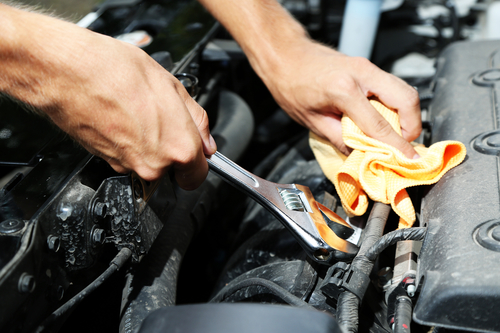There it is again, that sickening sound when you step on the brake. Maybe you’re feeling an unnerving shimmy in the steering wheel. Perhaps your car is telling you it’s time for a trip to the mechanic. Some things in life can’t be avoided; car repair is one of them. Money is tight, though, and you’re thinking it couldn’t have come at a worse time.
Relax, not all car repair has to involve terrifying bills. Not all mechanical problems are created equal. For the most part, you want to be sure that you have a safe, reliable vehicle that won’t leave you stranded.
How much you spend on car repair depends on a number of factors, some of which are under your control. What is your vehicle used for? What’s the age of your car? How long do you intend to keep it? What’s your budget?
Your car repair priorities may be a bit different if you operate a small fleet of vehicles for your business. Breakdowns can cause costly disruptions and you don’t want that.
Preventive maintenance
 Car repair costs can be challenging and it’s tough to budget for them as you can’t predict the cost of automotive troubles. There are, though, interventions you can take to keep your vehicle on the road without breaking the bank.
Car repair costs can be challenging and it’s tough to budget for them as you can’t predict the cost of automotive troubles. There are, though, interventions you can take to keep your vehicle on the road without breaking the bank.
There’s no getting around it, an ounce of prevention is far better than a pound of breakdowns. Take for example the oil change. You may grumble about parting with $30 to $80 dollars for an oil change but it hurts a lot more to change an engine. That can cost between $4,000 and $8,000.
If you own several vehicles which sustain your business, engine troubles due to oil viscosity breakdown are just the sort of headaches you want to avoid. Change your oil every 5,000 to 7,000 miles. With older cars, you will want to change the oil more regularly. A regular engine check-up is a good way to avoid more costly car repair problems down the road.
Safety is priority one
If your brakes aren’t reacting as quickly as they should or are unusually noisy, changing them is non-optional. When it comes to vehicle safety there are no car repair shortcuts. Similarly, you don’t want to be driving around on bald tires. Reduced traction and the possibility of blowouts present an unacceptable risk.
Get a comprehensive inspection
It is a good idea to take your vehicle to the friendly neighbourhood automotive repair shop. You’re more likely to get honest pricing at a community oriented business that’s wiling to work with you. Let us take an in-depth look under the hood to draw up a priority list for you. Take the inspection results and hold them up against your budget to help determine your car repair priorities.
For example, repairing or replacing your transmission can be expensive. Your mechanic may determine the transmission has some life in it yet, so that you can save money to undertake that job later on.
You may think regular maintenance is both a hassle and costly but it is the best route to avoiding serious system failures in the future. These failures can not only cost you money in high car repair bills, but incur financial losses if you rely on your vehicle for work or the smooth operation of your business.
Check our car repair shop. We have all the expertise to ensure that you get the best out of your car and your budget.Take care of your car and your car will take care of you.

